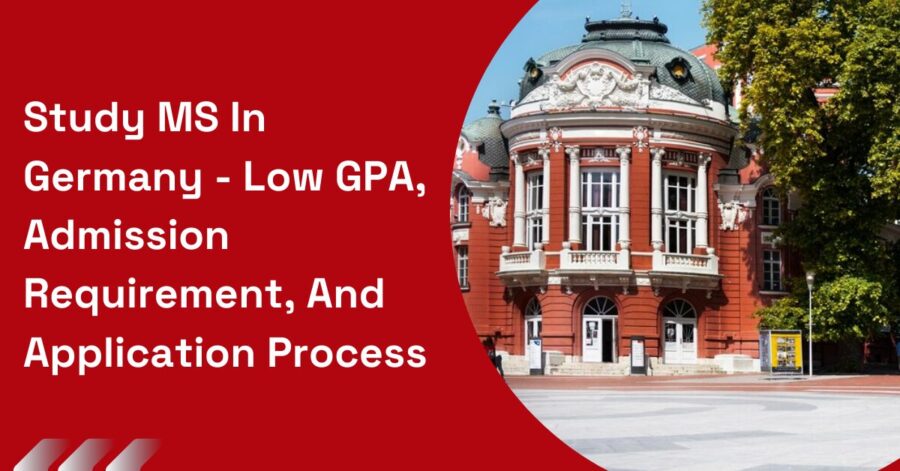14 August 2024
6 minutes read
Study MS In Germany – Low GPA, Admission Requirement, And Application Process

Key Takeaways
- German universities look beyond GPA, valuing work experience and motivation.
- Even with a lower GPA, you can access world-class education and career prospects.
- Thoroughly research and prepare your application documents to meet diverse requirements.
- Studying in Germany offers immense cultural exposure and robust career opportunities post-graduation.
Did you know over 400,000 international students are living their best lives in Germany, with nearly 1 in 10 chasing that coveted master’s degree? Sounds amazing, right? But let’s be real for a second. If you’re like many of us, you might be thinking, “That’s great, but what about my not-so-amazing GPA?” Trust me, I get it. The whole process of applying to German universities can feel like you’re trying to solve a Rubik’s cube blindfolded – confusing admission requirements, a puzzle-like application process, and that nagging voice saying “Are you sure you’re cut out for this?”
Here’s the thing though – don’t let those doubts stop you from chasing your dreams. German universities aren’t just looking at your GPA through a magnifying glass. They’re often way more interested in the whole package – your work experience, your passion for the field, even your budding German language skills.
In this guide, we gonna cover, admission requirement, the admission process, and how much GPA is required for MS in Germany.
Why Pursue MS In Germany?
Studying in Germany offers more than just academic growth. You’ll be immersed in a rich cultural landscape, from historic cities to modern metropolises. Germany’s central location in Europe also makes it an excellent base for exploring neighbouring countries, broadening your horizons both personally and professionally.

Here’s why you should pursue MS in Germany:
- German universities are renowned for their academic excellence and cutting-edge research.
- Many public universities offer tuition-free education, even for international students.
- Numerous MS programs are taught entirely in English, removing language barriers.
- Germany’s robust economy provides excellent career opportunities post-graduation.
- An 18-month job-seeking visa for graduates gives you ample time to launch your career.
- Strong university-industry partnerships facilitate internships and collaborative projects.
- State-of-the-art research facilities put you at the forefront of innovation in your field.
- Germany’s central location in Europe is ideal for exploring neighbouring countries.
How Much GPA is Required For MS In Germany?
When considering the admission requirements for a masters degree in Germany, one crucial aspect to focus on is the minimum GPA. German universities typically accept students who meet specific GPA criteria, though these can vary from one institution to another. For most programs, a minimum grade point average of 2.5 on a 4.0 scale is often required, but some universities probably have stricter requirements.
Additionally, certain programs might also require GRE or GMAT scores. Living and studying in Germany offers a unique experience, with many courses taught in English, although some programs do have German language requirements. Preparing for a masters degree in Germany involves understanding these academic prerequisites and planning accordingly to meet them.
What Is The Admission Requirement For Masters In Germany?
German universities accept a wide range of applicants, but understanding the specific admission requirements is crucial for a successful application. In this guide, we will outline the general criteria and provide a detailed overview to help you prepare for your journey into German education.
| Admission Requirement | Description |
|---|---|
| Bachelor’s Degree | A relevant undergraduate degree from a recognized institution. The degree should be equivalent to a German bachelor’s degree in the same field of study. |
| Minimum GPA | Typically, German universities accept a minimum grade point average of 2.5 on a 4.0 scale, but this can vary by program and institution. Some universities may have higher GPA requirements. |
| Language Proficiency | Courses in English require proof of English proficiency (e.g., TOEFL, IELTS). For programs taught in German, you must demonstrate proficiency in the German language (e.g., TestDaF, DSH). |
| GRE/GMAT Scores | Certain programs, especially in business or technical fields, might require GRE or GMAT scores for MBA as part of the process. |
| Statement of Purpose (SOP) | A well-written Statement of purpose explaining your academic and professional background, as well as your motivation for choosing the specific program and university. |
| Letters of Recommendation | Typically, two to three academic letters of recommendation from professors or professionals who can attest to your academic capabilities and potential. |
| CV/Resume | A comprehensive resume personal statement detailing your academic achievements, work ex, research projects, and any relevant skills or certifications. |
| Additional Requirements | Some programs may require a portfolio (for design and arts programs), work ex (for MBA programs), or an interview. |
What Is The Application Process For Masters In Germany
German universities are known for their high academic standards, and the process reflects this rigour. Below is a detailed guide to help you navigate the process effectively and increase your chances of securing admission to a prestigious German institution.
Research Programs and Universities
Identify the master’s programs that align with your academic and career goals. Research the universities offering these programs, considering factors such as faculty, research opportunities, and campus facilities.
Check Eligibility Requirements
Review the specific admission requirements for each program, including academic qualifications, language proficiency, and any standardized tests (e.g., GRE, GMAT). Ensure you meet the minimum Grade Point Average and degree prerequisites.
Prepare Required Documents
Collect and organize all necessary documents, including your bachelor’s degree certificate, transcripts, language proficiency test scores, and standardized test scores if required. Obtain letters of recommendation from professors or professionals who can attest to your academic and professional capabilities.
Write a Statement of Purpose (SOP)
Draft a compelling statement of purpose that highlights your academic background, professional experiences, and motivation for pursuing a masters degree in Germany. Tailor the SOP for each program to reflect how it aligns with your goals.
Create a CV/Resume
Prepare a detailed CV that includes your educational background, work experience, research projects, publications, and any relevant skills or certifications.
Apply Online
Most German universities use online application portals, such as Uni-Assist, for processing applications. Create an account on the relevant portal and fill out the application form accurately.
Upload Documents
Upload all required documents to the application portal. Ensure that each document is properly scanned and legible. Double-check the document requirements for each program, as they may vary.
Pay Application Fees
Some universities may charge an application fee. Ensure you pay this fee as instructed to avoid any delays in processing your application.
Submit the Application
Review your application thoroughly before submitting it. Check for any errors or missing information. Submit the application within the specified deadline for each program.
Prepare for Interviews
Some programs may require an interview as part of the selection process. Prepare for potential interviews by reviewing common questions and practicing your responses.
Await Decision
After submitting your application, wait for the university’s decision. This may take several weeks to a few months, depending on the program. Check your email regularly for any updates or additional requests from the university.
Secure Funding and Visa
If accepted, you will need to arrange for funding to cover tuition fees and living expenses. Explore scholarships, grants, and other financial aid options. Apply for a student visa by providing the necessary documents, including your admission letter, proof of financial resources, and health insurance.
Prepare for Departure
Once your visa is approved, make travel arrangements and prepare for your move to Germany. Familiarize yourself with the culture, language, and other aspects of living and studying in Germany to ensure a smooth transition.

Top 10 Universities In Germany Accepts Low GPA
Germany is renowned for its high-quality education system and is home to some of the world’s top universities. Interestingly, many of these institutions offer opportunities for students with lower GPAs, reflecting the inclusive nature of German education. Below is a list of the top 10 universities in Germany that accept lower GPAs, along with their QS World University Ranking, average fees, and the average salary after completing an MS degree.
| University | QS Ranking | Average Fees (EUR/year) | Average Salary after MS (EUR/year) |
|---|---|---|---|
| University of Duisburg-Essen | 751-800 | 1,500 | 50,000 |
| University of Kassel | 801-1000 | 1,600 | 48,000 |
| University of Siegen | 701-750 | 1,600 | 47,000 |
| University of Paderborn | 751-800 | 1,500 | 49,000 |
| University of Bremen | 501-510 | 2,000 | 52,000 |
| University of Würzburg | 601-650 | 2,500 | 53,000 |
| University of Greifswald | 601-650 | 2,200 | 51,000 |
| University of Regensburg | 601-650 | 1,800 | 50,000 |
| University of Rostock | 601-650 | 2,300 | 48,000 |
| University of Kiel | 501-510 | 2,000 | 54,000 |
Conclusion
If you’re aiming to study for a master’s degree in Germany but are worried about your GPA, don’t let that hold you back. The German education system values the overall potential of a student, not just their grades. Many top universities in Germany welcome students with a holistic approach to applications, considering experience, motivation, and language skills.
With careful preparation and a strong application, you can secure a spot in a prestigious German institution and embark on a transformative educational journey. So, take the plunge, prepare diligently, and pursue your dream of studying in one of the world’s best educational landscapes
Leverage Ambitio’s expertise to make informed decisions by crafting a shortlist that reflects your goals and values. Ambitio Shortlist Builder provides you with the insights and data needed to make choices that are not just good, but great for your future.
FAQs
Can I Get Admission with a Low GPA?
Yes, many universities consider strong profiles beyond GPA. Showcase achievements, projects, and practical experience in your application.
Which Universities Accept Low GPAs?
Hochschule Esslingen and the University of Potsdam are known for inclusive admission policies. Research and explore options that align with your aspirations.
Are GRE/GMAT Scores Mandatory?
Not always, but competitive scores can enhance your application, particularly with a lower GPA.
Can I Apply with a 3-Year Bachelor’s Degree?
Some universities accept 3-year degrees, especially if they’re equivalent to German degrees.
Are Scholarships Available in Germany?
Yes, many German universities offer scholarships based on merit or specific criteria. Research and apply for relevant scholarships.
Is it possible to study a Master’s degree in Germany as an international student?
Yes, it is possible for international students to study a Master’s degree in Germany. Many universities in Germany welcome international students, and there are a variety of programs available in English
What are the most popular subjects to study at the Master’s level in Germany?
The most popular subjects to study at the Master’s level in Germany include engineering, business, economics, and computer science. However, there are also a wide variety of other subjects available, including the arts, humanities, social sciences, and natural sciences

You can study at top universities worldwide!
Get expert tips and tricks to get into top universities with a free expert session.
Book Your Free 30-Minute Session Now! Book a call now




























